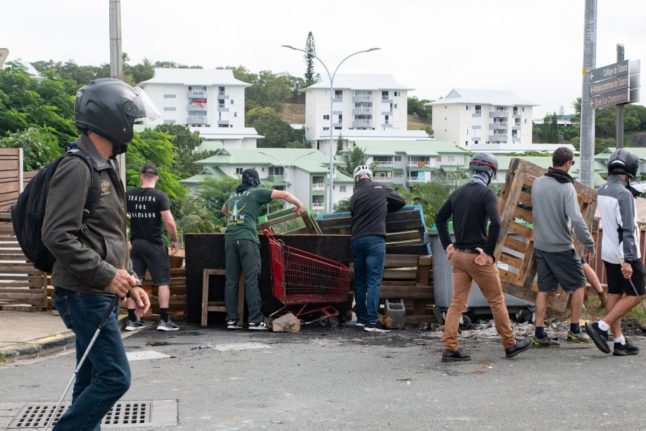First, Mayotte, in the Indian Ocean 8,000km from Paris, is the smallest, newest, poorest and most troubled of the five overseas départements (counties) which are theoretically part of France.
Taken together, its two islands are about the size of the Isle of Wight. Into this tiny space are squashed 300,000 people, more than half of whom are migrants from the nearby Comoros islands or from the African mainland.
Mayotte, in the strait between the African continent and Madagascar, has been disrupted for weeks by angry demonstrations and road-blocks. The islanders are not protesting against French rule. They are protesting against a failure to prevent seaborne migration from the Comoros (100 kilometres away) and Africa (200 kilometres away).
The second reason for the hysteria is the febrile state of French politics. Macron-bashing has become the default position of large parts of the French Left, Right and Far Right.
Thirdly, Macron and his new Prime Minister Gabriel Attal have recently been taking a malign, and dangerous, pleasure in flirting with Far Right language and ideas.
Last weekend Interior Minister Gérald Darmanin flew to Mayotte and announced plans to remove from the islands the constitutional guarantee – “le droit du sol” – which means that babies born in France have a right to be French.
Explained: What is France’s droit du sol?
One of the attractions of Mayotte to its still poorer neighbours is the fact that they can obtain a residence card if they have a French child. A baby born in Mayotte is, the migrants believe, a passport to mainland France. (It isn’t really but more on that later.)
Mayotte only has one hospital. Over 90 percent of the babies born there have Comorian or African parents.
Darmanin said the abolition of the “droit du sol” in Mayotte – and Mayotte alone – would remove the main motive for making the dangerous journey across the Indian Ocean in a small boat. It would give “new hope” to Mayotte.
Cue, an explosion of politically-driven rejoicing on the Right and the Far Right of French politics and an explosion of abstract or politically-driven indignation on the Left.
The Right and Far Right said that the Mayotte exception, though welcome, must be a prelude to the abolition of the “droit du sol” for France as a whole.
“How can the constitution say one thing for a small part of France and another thing for the rest?” asked Sébastien Chenu, of the Rassemblement National.
Actually, Sébastien, it already does. Mayotte and other overseas parts of France are already exempt from parts of the French constitution and French law. In Mayotte, the droit du sol has already been somewhat limited since 2018 but not removed completely.
“If the droit du sol is not abolished, mainland France will be like Mayotte in a few years’ time,” said Marion Maréchal-Le Pen.
Really, Marion? Please do your sums. That would require the migration of 60,000,000 people.
The Left said that Darmanin’s announcement had “opened a Pandora’s box” for the racist ideas of the Far Right. The principle that anyone born in France could become French was “non-negotiable”. A “taboo” had been broken. President Emmanuel Macron and Gérald Darmanin were “demolishing our Republican values”.
That may make abstract sense from 8,000 kilometres away. But what does the Left believe should be done to help the suffering people of Mayotte, few of whom are white and most of whom are Muslim?
Their problems have been largely ignored by successive governments of Left, Right and Centre since 99.4 percent of the islanders voted to be French in 1976 and then voted overwhelmingly to become the 101st departément of France in 2009.
The rest of the Comoros archipelago voted for independence a half century ago. It suited France to have a second Indian ocean pebble (after Réunion) for strategic reasons. Little has been done to boost the island’s economy.
There was no TV in Mayotte until 1986. Over 77 percent of islanders now live in poverty, compared to 14 percent in France as a whole. Almost a third of homes have no running water. Only one third of adults have a job.
In recent years, a constant illegal influx of mostly young Comorians – desperate people of the same race and religion – has caused a social and economic crisis without parallel anywhere else in global France.
Abolishing the droit du sol in Mayotte will not solve all these problems. The vast majority of Mahorais believe that it is essential first step to prevent them from getting worse.
In an interview with Ouest-France on Monday, Darmanin said the government’s decision to propose a constitutional change was “pragmatic”, not “ideological”. He urged the “clever thinkers” in Paris to “go to Mayotte” and see the islands’ problems for themselves.
He may be right. Much of the commentary of recent days has nothing to do with the desperate realities of an island of which most French politicians, Right or Left, know or care little.
But to attack “clever thinkers” (beaux esprits) is Far Right language.
The problem for Darmanin and Macron is that the Mayotte policy is being lumped together with their pre-Christmas decision to accept Far Right ideas to rescue a blocked immigration bill. They knew that those added clauses would be struck down by the Constitutional Council (as they were).
Marine Le Pens’ Far Right is now braying about a “second ideological victory”. The Left is alleging a second “ideological betrayal”.
Neither they, nor the Left, appear to have studied the small-print of what Darmanin said.
At present, Comorian migrants who have French children can claim residence permits in Mayotte but are refused visas to travel to metropolitan France. In other words, they pile up in Mayotte, increasingly poor and desperate.
Darmanin said that this barrier would be lifted as soon as the “droit du sol” was removed from Mayotte. In other words, the government is proposing to deter migration into Mayotte but allow much greater emigration out of Mayotte and into “European France”.
That does not sound much like a Far Right policy despite the Far Right language.
Macron and his government are often accused of being “hors sol” (detached from reality). The new Prime Miniter Gabriel Attal has sworn to correct that by making a series of rapid decisions which have an immediate, positive impact on the lives of ordinary people. Good luck with that.
The Mayotte decision fits Attal’s promised pattern. The government will argue that it is the Far Right and Left reaction – and much of the French media commentary – which is abstract, ideological and “hors sol”.
Stand by for a long debate on the proposed constitutional change while Mayotte continues to suffer and protest. In theory, with Right and Far Right support, the government can obtain the two-thirds vote of a Congress of both houses of parliament that it needs.
In theory…
But wait until the triumphant Right and Far Right get around to reading the small print on exit visas from Mayotte to the rest of France.



 Please whitelist us to continue reading.
Please whitelist us to continue reading.
The droit du sol is not deeply anchored in French history nor politics. When living in Paris in the 1990s we had a daughter who, being born in 1997 to American parents, was not granted le droit du sol.
She could have applied for citizenship, had she lived in France for 5 years before turning 16, but we moved back shortly after she was born and she did not take up residency here again until she was 17.
It might be worth writing about that period, to offer more perspective.
Hi, that’s actually still the case. ‘Droit du sol’ isn’t an automatic granting of French citizenship to babies born here, it comes with lots of strings attached. More details here – https://www.thelocal.fr/20240213/citizenship-what-is-frances-droit-du-sol
This is the price France is paying for trying to hold on to its colonial possessions overseas. Reunion and Mayotte should have been given independence a long time ago.
I always appreciate the nuanced and critical commentaries by Mr.Lichfield. I do wonder if he’s not being too charitable regarding the “fine prints” though. There is no guarantee that they will follow through with the increase of emigration, especially given their current political stance regarding immigration in general and their dalliance with the right. The victory lap by the right may already take the fine prints into account.